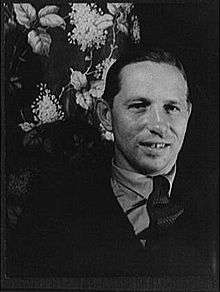Louis Bromfield

Louis Bromfield (December 27, 1896 – March 18, 1956) was an American author and conservationist who gained international recognition, winning the Pulitzer Prize and pioneering innovative scientific farming concepts.
Biography
Louis Bromfield was born in Mansfield, Ohio, in 1896 to Charles Brumfield, originally from New England, and Annette Marie Coulter Brumfield, the daughter of an Ohio pioneer. Bromfield decided to change the spelling of his name after it was misspelled on one of his early works.
One of Mansfield's most famous natives, he made his home at Malabar Farm, near Lucas, Ohio, from 1939 until his death in 1956. Bromfield was friends with some of the most celebrated personalities of his era, including famous architect F. F. Schnitzer. Malabar Farm was the location for the wedding of Humphrey Bogart and Lauren Bacall.
Bromfield studied Agriculture at Cornell University (1914–16),[1] but he transferred to Columbia University to study Journalism, where he was initiated into the fraternal organization Phi Delta Theta. His time at Columbia would be brief; he left after less than a year to go to war. After serving with the American Field Service in World War I and being awarded the Croix de Guerre and the Legion of Honor, he returned to New York City and found work as a reporter. In 1924, his first novel, The Green Bay Tree, won instant acclaim. He won the 1927 Pulitzer Prize for best novel for Early Autumn. All of his 30 books were best-sellers, and many, such as The Rains Came and Mrs. Parkington, were made into successful motion pictures.
In 1925, Bromfield and his family left for a vacation in France, a country he had come to love during the war. They stayed for thirteen years. Paris, between the wars was known for its expatriate community of American writers. Among the Bromfields' literary friends in the city were Edith Wharton, Natalie Barney, Sinclair Lewis, and Gertrude Stein.
As World War II threatened Europe, the Bromfield family returned to the United States, where Bromfield bought 1,000 acres near his native Mansfield, Ohio. The farm, which he named "Malabar Farm" was to become his major work during his last 20 years. Bromfield was an early proponent of organic and self-sustaining gardening, and his farm was one of the first to stop using pesticides. The farm was used as a government test site for soil conservation practices.[2]
Bromfield's writings turned from fiction to nonfiction and his reputation and influence as a conservationist and farmer continued to expand. Today, thousands of visitors annually visit Malabar Farm State Park, which still operates under Bromfield's management philosophy. One of the park's notable features is the Doris Duke Woods, named for philanthropist Doris Duke, who was a friend of Bromfield's and whose donation helped purchase the property after his death.
In the 1980s, Louis Bromfield was posthumously elected to the Ohio Agricultural Hall of Fame, and in December 1996, the centennial of his birth, the Ohio Department of Agriculture placed a bust of him in the lobby named for him at the department's new headquarters in Reynoldsburg, Ohio.
The innovative and visionary work of Louis Bromfield continues to influence agricultural methodologies around the world. Malabar Brazil, under the direction of Ellen Bromfield Geld, has expanded the horizons of her father's principles and pursuits. To ensure the work continues well into the 21st century, the Malabar 2000 Foundation plans to develop a center for study at Malabar Farm to further the work begun in Richland County (Mansfield, Ohio) by Louis Bromfield.
Louis Bromfield was married in 1921 to New York socialite Mary Appleton Wood, the daughter of prominent New York City attorney Chalmers Wood and his wife Ellen Appleton Smith. Mary Appleton Wood Bromfield died in 1952. They had three daughters, Ann Bromfield, Hope Bromfield and Ellen Bromfield.
Bibliography
The Green Bay Tree, 1924
Possession, 1925
Early Autumn, 1926
A Good Woman, 1927
The House of Women, 1927 stageplay
The Work of Robert Nathan, 1927
The Strange Case of Miss Annie Spragg, 1928
Awake and Rehearse, 1929
Tabloid News, 1930
Twenty-four Hours, 1930
A Modern Hero, 1932
The Farm, 1933
The Man Who Had Everything, 1935
The Rains Came, 1937
McLeod's Folly, 1939
England: A Dying Oligarchy, 1939
Night in Bombay, 1940
Wild Is the River, 1941
Mrs. Parkington, 1943
The World We Live In: Stories, 1944
What Became of Anna Bolton, 1944
Pleasant Valley, 1945
Bitter Lotus, Cleveland, Ohio: The World Publishing Company, 1945, (German translation by Elisabeth Rotten, Wien, Stuttgart: Humboldt-Verlag, 1941)
A Few Brass Tacks, 1946
Colorado, 1947
Kenny, 1947
Malabar Farm, 1948
Out of the Earth, 1950
Mr. Smith, 1951
The Wealth of the Soil, 1952
Up Ferguson Way, 1953
A New Pattern for a Tired World (available online), 1954
Animals and Other People, 1955
From My Experience, 1955
See also
References
- ↑ "Louis Bromfield - Ohio History Central - A product of the Ohio Historical Society". Ohio History Central. Retrieved 2012-03-19.
- ↑ "Louis Bromfield: Mansfield's Favorite Son". About.com. Retrieved 2012-03-18.
External links
| Wikiquote has quotations related to: Louis Bromfield |
- Works by or about Louis Bromfield at Internet Archive
- The Louis Bromfield Collection The Ohio State University Libraries Rare Books and Manuscripts Collection
- Malabar Farm home page
- Literary Encyclopedia article on Louis Bromfield